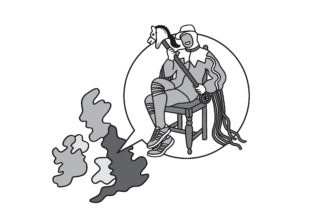John Doran’s new BBC Radio 4 series looks at the experimental artists thriving across the UK
New Weird Britain is at least one silver lining happening within music and art right now

New Weird Britain is at least one silver lining happening within music and art right now
“It’s my belief that weird times inculcate weird culture,” says writer and Quietus.com co-founder John Doran. In his new BBC Radio 4 series, broadcast throughout June, Doran makes the case for the disparate network of experimental musicians and artists operating across the UK that he terms ‘New Weird Britain’. Starting out as a VICE article, then a monthly column by Noel Gardner, New Weird Britain is concerned with what these artists have in common, and the socioeconomic factors producing these commonalities. For anyone interested in the British underground and our present moment, the series is essential.
So what is ‘New Weird Britain’? According to Doran, it’s “much more likely to be cross-disciplinary, a lot less likely to be pinned down by genre”. It takes place in warehouses, barns, arts spaces and church halls, as well as crucial venues like North London’s New River Studios and Salford’s infamous White Hotel. It includes artists like Gazelle Twin, Richard Dawson and the performance artist Lone Taxidermist. What isn’t ‘New Weird Britain’? A genre itself – more a spirit of a time, a way of starting a conversation about something happening in this country (though plenty of genre tags are, it’s worth adding, pretty spurious: “What are the things that bind Cabaret Voltaire, Bauhaus and Gang of Four?” Doran argues, “there aren’t any really, but they’re all post-punk.”)
“It started out as a suspicion that things are getting weird in this country, culturally speaking,” Doran explains, pointing to the rise of Black Midi (who are not ‘New Weird Britain’, but another symptom all the same), Mary-Anne Hobbs’ promotion to daytime 6Music, and the fact that Oxfordshire experimental music festival Supernormal Festival sold out in an hour this year – “if you’d have said that about four years ago I would have laughed at you”. Supernormal is crucial to Doran’s own understanding of ‘New Weird Britain’; it was at the 2017 festival that he had an epiphany watching UKAEA performing what Doran describes as “a weird kind of gabba ritual in a barn”. This epiphany was followed by something of a depression. “I was thinking, I could write about all of this stuff, this really once-in-a-lifetime stuff that everyone should be shouting from the rooftops about, and no one will read about it.” Rather than despondency, this forced him to re-assess how he was making the case for the music his job is to champion.
Though any ‘London is dead’ narrative remains too binary, too reductive, the series does tell a fascinating story about the balance of power in British music. For the first time, Doran points out, “there are probably more artists and musicians leaving London than there are moving to London; I’m guessing at that, but I’m embedded in this culture and that’s how it feels to me.”
For myself, one of the most poignant aspects of the series is the questions it asks about how profound economic uncertainty changes ambitions. This is echoed in a fascinating point made by the electronic producer Loft in the series, who points to her own experimental music as a reaction to her formative years being amidst the one-two punch of the financial crash and the exodus of money from the music industry. How could these things not be transformative to how artists operate in this country? Doran agrees that this point is central to what is happening in Britain. “I really feel the same way about things in my own life. It can be very depressing and distressing in life to face up to how little control you have in your own life; also when this is happening against a backdrop of things getting worse socially, financially and politically. But. Once you fully accept the way things are going, it can be liberation. It can be a silver lining to a very big, dark cloud.” Doran does not think that it’s a good idea that artists can no longer make money, but does want to ask “as a pragmatist, once you’re in that position what’s the best thing you can make of it? And I think that the best thing you can make of it is that you no longer have to compromise on any level.”
In the series, Urocerus Gigas from Guttersnipe says that you can “find the five weirdos in every town now, you know what I mean? Everyone is online, and you can contact them, no matter where you are. You can find your own little weirdo community where you make the craziest noise or the craziest music.”
Be not afeard; this isle is full of new weird noises.